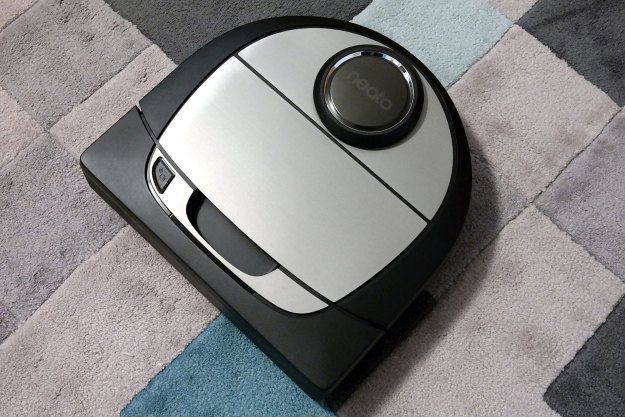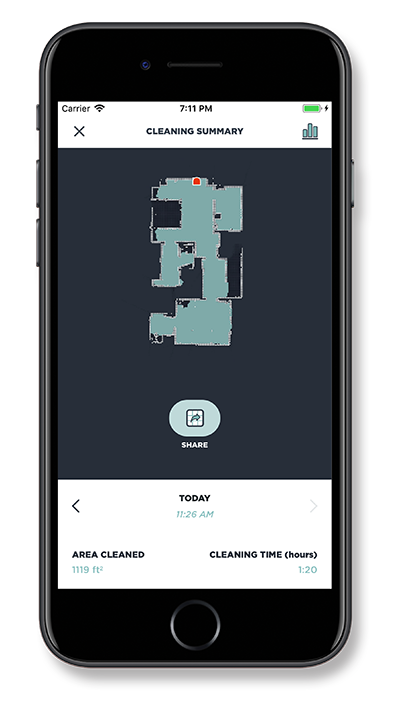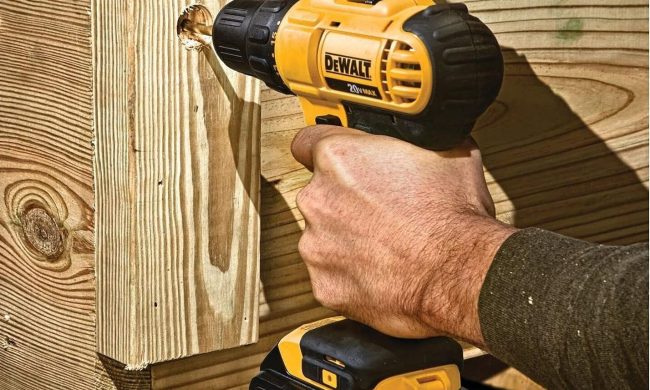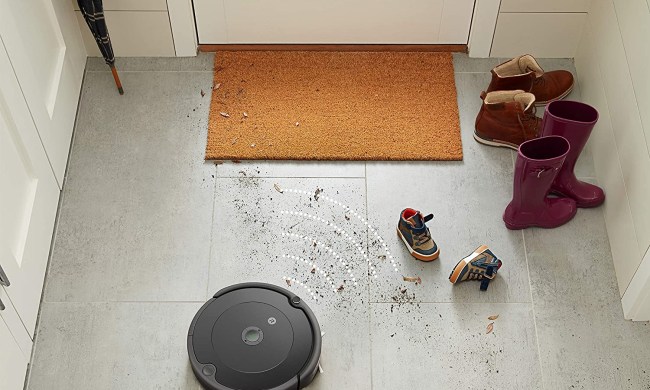
“The Botvac Connected D7 may be Neato’s smartest cleaner, but it doesn’t do enough to justify its price.”
- Effective cleaning of range of floor types
- Detailed, laser-guided room mapping for multiple floors
- Simple and friendly mobile app
- Smart battery charging supports more efficient cleaning
- Better on corners than other models
- Louder than many robovacs
- Some navigation issues with No Go Lines feature
- Only three floor plans can be stored at one time
- Expensive
We continue to be impressed by the great-value performance of budget robot vacuums, but at the top end of the market, innovative features like multi-floor mapping, zone cleaning, and even automatic dirt disposal are making premium devices more convenient and simpler to use.
The $800 Neato Botvac Connected D7 is the company’s range-topping cleaner. Boasting Neato’s unique D-shaped design (meant to deliver better edge and corner cleaning), this Wi-Fi equipped model supports a slew of advanced features. They include laser-guided multi-floor mapping, Amazon Alexa/Google Assistant voice control, two-hour battery life, and “no-go” virtual boundaries, managed directly from the accompanying app.
In addition, Neato added a zone cleaning feature to the D7, which allows you to target specific areas of your cleaning map – ideal for kitchens and dining areas that need regular maintenance. It’s a feature already available in the recently-reviewed Roomba i7, priced from $699. With a premium price, we expect the Botvac Connected D7 to compete strongly on both convenience and performance.
Unique, D-shaped design targets enhanced edge and corner cleaning
The first thing you’ll notice about a Neato Botvac is its “D” shape, which is a change from the circular form factor prevalent in robot vacuums. While the design gives the Botvac a simple, almost retro appearance, the shape is about more than mere aesthetics. Neato says the rectangular end of the cleaner is better able to pick up dust from corners and the edges of walls. Where other vacuums rely on a small, central brush to sweep dirt into the vacuum, the D7 sports a much wider brush at its front, supported by a side spinner that assists with edge cleaning.
The D7 arrives with a compact charging base, two spare dust filters, a cleaning brush, and boundary marker strip for creating a physical “no-go” zone. The latter, however, shouldn’t be required with the D7’s virtual boundary feature.
The cleaner navigates using a laser sensor neatly perched on top of the device, which continuously scans the surroundings to create a floor plan of your home. Where the Roomba i7 is supported by a top-mounted camera that tracks the robot’s location using your ceiling, opting solely for laser sensors allows the Botvac to operate in darkness. Meanwhile, additional sensors on the underside of the D7 allows the device to accurately follow walls and prevent the device falling down stairs and other hazardous drops.
Flip up the central flap to reveal the dust bin and filter, which should be emptied after each clean. Neato recommends the dust filters are changed every 1 to 2 months, so the inclusion of two spares in the box is a useful addition. Completing the design is a mechanical power button and bright LEDs denoting battery charge and cleaning status.
Quick setup, cleaning experience that lacks finesse
A quick and easy setup connects the cleaner to your Wi-Fi network and installs any pending software updates. Be sure you have the latest updates on board, as these include important new features, such as No Go Lines, as well as the usual bug fixes. A brief pause for a reboot and you’re ready for your first clean.
The Botvac’s unique D-shape is about more than mere aesthetics.
The D7 will use its first run to clean and create a floor plan of your premises. Up to three floor plans can be stored in the robot – far less than the 10-plan capacity of the Roomba i7, but sufficient for most homes. Once fired up, we found the D7 to be much louder in operation than its peers, even on Eco mode. Both the vacuum and the cleaner’s rotating brushes caused quite the racket. If we were being charitable, we’d call the noise “bearable,” but it’s sufficient to disrupt your work and louder than desired in a top-class cleaner. A Turbo mode, which boosts suction, also increases the din.
The robot navigated carefully throughout our 400 square-feet ground-floor on its first run, which lasted around 35 minutes. The D-shaped device was certainly able to fit into tighter corners than other robovacs we’ve tested, although the bulkier shape results in the Botvac having to delicately maneuver around chair and table legs – a feat it managed successfully. Indeed, even on its first run, we didn’t see the D7 bump too many times into furniture around the room, although we were disappointed to see the cleaner miss its own charging base on subsequent runs, which it pushed out of position then continued to knock as it cleaned. We should say, however, that the Botvac still managed to negotiate its way back to base for charging, despite its new orientation.

Unlike the Roomba i7, which demands at least three cleaning runs before displaying a floor plan, Neato’s cleaner was happy to share its plan after a single operation. The results were very good. Our ground floor plan was accurately mapped, with furniture the D7 had to clean around (such as sofas) easy to spot on the plan. Coverage, marked in blue on the dark gray plan, was shown clearly.
Both the vacuum and the cleaner’s rotating brushes caused quite the racket.
With zone cleaning now available on the Botvac Connected D7, we found it to work well. It allows you to define and then command the robot to clean specific areas of your plan. A No Go Line feature (or virtual boundaries as its more generically known) is super-simple to use. Using the Neato app, drag a line on your floor plan between two walls, hit Save, and you’re done. Once set, we were concerned to see the robot complaining that it was unable to locate the original cleaning plan, but a second attempt worked fine. A third attempt saw the robot continually spin 360-degrees on its central axis, which was disconcerting, but resolved when we disabled the No Go Lines option. Overall, we’re calling this a “work in progress,” but one that needs to rapidly improve.
Effective cleaning performance, but edges and corners disappoint
During cleaning, the Botvac Connected D7 did a good job of navigating across a variety of floor surfaces around the home, rarely getting stuck. When in trouble, the robot fires a notification to your phone to politely request a helping hand. Despite being noisy, cleaning performance was good. Despite cleaning our floors regularly with manual and robot vacuums, the Neato cleaner still managed to find a healthy amount of pet hair and other debris. We noticed that the D7 left circular sweep marks on longer pile rugs, though, which we’ve not encountered with other robot vacuums.
One area where robovacs traditionally struggle is corner cleaning. In tests, even the range-topping Roomba i7 couldn’t effectively clear dirt and dust lurking in corners. We were excited to see how Neato’s D-shaped cleaner competed, and while results were better than we encountered with the Roomba i7, a significant amount of dust (actually coffee grinds in our test) was left behind by both devices, meaning your regular vacuum isn’t quite ready for scrap.
When it comes to spot cleaning, the D7 only offers a manual mode (available via the app or a double-press of the robot’s Start button). Manual mode triggers more intensive cleaning of a four feet by six feet virtual area, starting with the boundary, then a straight-line interior clean. It’s a useful addition for spills and messy areas like kitchens, but it’s behind the automated spot clean feature available on the Roomba i7, which detects dirtier floors and cleans more intensely without manual intervention.

One additional feature we particularly liked on the D7 was its power management. During cleaning, the Neato app clearly displays the robot’s battery capacity in percentage and as a “time to empty.” Once the battery is almost depleted, the robot automatically returns to the charging base and calculates exactly how much additional juice it will need to complete the cleaning job. Rather than wait until it’s fully charged, once the robot has sufficient power, it’ll resume the operation and finish up. Neato, indeed.
Multi-floor cleaning, at a price
One big plus of the Botvac Connected D7 over budget competitors is its multi-floor mapping capabilities. We were delighted to see floor mapping available in the $299 Ecovacs Deebot 901 but with support for just a single floor, its features are limited.
Three floor maps are supported on this Neato cleaner, but there are some caveats. The company recommends that you purchase additional charging bases for each floor you wish to clean. It’s not mandatory, but as the robot’s cleaning operation has to be launched from its charging base, you’ll quickly find yourself lugging the single base provided around your home. If you wish to use the D7’s No Go Lines feature, Neato says the charging base shouldn’t be moved – so, purchasing one or more additional bases (at $40) is likely to be inevitable. That’s a disappointment given the Roomba i7 is more than happy to map up to ten floors with no need to move its clean base.
Elsewhere, the friendly Neato app supports a range of features to make regular cleaning easy. Scheduling features allow you to repeat cleaning runs at a time and day of your choosing. Google Home and Amazon Alexa integrations are both available in the United States, but only a small number of additional countries are supported on the latter, while Google Assistant fans outside the U.S. are out of luck. Conversely, support for IFTTT means there’s plenty of recipes available for smart home geeks.
Warranty information
The Neato Botvac Connected D7 is backed by a one-year warranty, covering defects in material and workmanship.
Our Take
Neato’s Botvac Connected D7 is solid robovac that doesn’t quite justify its asking price. Considering the Roomba i7 is $100 cheaper (without the base cleaning station), we find the Botvac to be less refined overall and lacking the full range of intelligent features that makes i7 a clear leader in its class. The D7 is certainly a step-up from budget competitors – it’s easy to get along with, offers multi-floor mapping, and delivers great cleaning performance. But, if we had to choose, we’d recommend the Roomba i7 and an extra $100 in your pocket.
Is there a better alternative?
Starting at $699, the Roomba i7 may not have the Botvac’s corner cleaning capabilities, but it delivers a stronger array of features out of the box and a more refined experience, making it an overall smarter choice.
How long will it last?
All robovacs require regular cleaning and maintenance, including the replacement of consumables such as filters, brushes and batteries. While there is an ongoing investment required to keep the D7 performing at its best, you should expect longevity if you keep the device maintained. Since launch, Neato has released a number of software updates to enhance the D7’s features including the availability of zone cleaning
Should you buy it?
If it were cheaper, yes. But for now, the Roomba i7 is a more refined, smarter choice.
Updated January 31, 2019 to note that the Neato Botvac now has zone cleaning.








